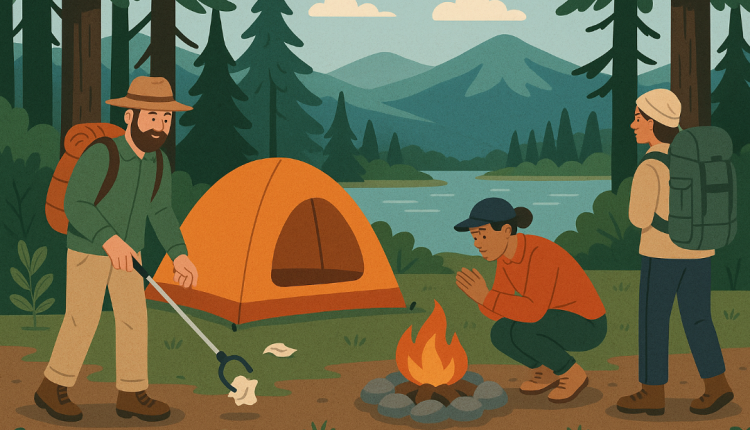Exploring the Benefits and Joys of “Leave No Trace” Camping: A Guide to Responsible Outdoor Adventure
Understanding “Leave No Trace” Principles
When venturing into the wilderness, following the “Leave No Trace” (LNT) ethics ensures we preserve pristine environments for future explorers. These seven foundational principles guide conscientious campers: plan ahead, stick to durable surfaces, properly dispose of waste, leave what you find, minimize campfire impact, respect wildlife, and be considerate of other visitors. Embracing these guidelines not only protects nature but also fosters deeper connection and respect for the great outdoors.
1. Plan Ahead and Prepare
Good camping starts long before you pitch your tent. Research the area’s rules, weather patterns, and potential hazards. Make reservations if needed, check seasonal restrictions, and create a backup plan for unforeseen challenges. Planning ensures both personal safety and environmental protection—like selecting campsites that allow recovery time for fragile ecosystems.
2. Protect Water Sources and Stick to Durable Surfaces
Fragile trails and streamsides can’t sustain heavy traffic. Stick to established paths, campsites, and clearings to reduce soil erosion and habitat destruction. Stepping off-trail in sensitive areas—like meadows, fragile slopes, or shorelines—can damage plant life and disrupt wildlife habitats. Staying on durable surfaces helps preserve the natural landscape for everyone.
3. Dispose of Waste Properly
Pack it in, pack it out—this mantra holds true. Always carry out all trash, leftover food, and litter. Human waste requires special care: use provided facilities or dig a cathole at least 6–8 inches deep, situated 200 feet away from water, trails, and campsites. When washing dishes or yourself, disperse soapy water away from water sources and scatter strained scraps away from camp. These steps prevent pollution and maintain clean ecosystems.
4. Leave What You Find
The allure of picking wildflowers or snapping off a branch may be strong, but leaving nature untouched ensures its beauty endures. Rocks, artifacts, plants, and historic structures are invaluable pieces of the ecosystem. Disturbing them alters habitats. Instead, photograph your discoveries and share their beauty without altering the environment.
5. Minimize Campfire Impact
Campfires can scar landscapes and spark wildfires during dry spells. Use lightweight stoves for cooking. If fires are allowed, keep them small using only local deadwood—never burned wood from home. Build fires in existing pits or on designated fire pans. After, drown embers thoroughly, stir ashes, and cover with dirt to remove evidence of your presence.
6. Respect Wildlife
Observing wildlife from a distance ensures both their safety and yours. Avoid feeding animals—it alters their behavior and can make them dependent on humans. Store food securely in animal-resistant containers or hung off the ground. Keep pets leashed and curious children supervised. Wild animals are best admired on their own terms.
7. Be Considerate of Other Visitors
Outdoor spaces are shared with others seeking solitude and connection with nature. Keep noise levels low—use headphones for music. Camp out of sight from trails and other tents. Yield the trail to uphill hikers and respectfully share cooking space. Leave the campsite looking even better than you found it.
Planning for a Truly Impactful Trip
A genuinely unforgettable camp-out blends minimal environmental impact with maximum personal enjoyment. Begin by choosing an off-peak timeframe—weekdays or shoulder seasons—to reduce crowding. Select a less-traveled route and campsite to foster a sense of seclusion and peace. Bring a compact camp stove, long-lasting battery pack, and a journal to reflect on your experience rather than relying solely on photographs.
Innovative Gear Ideas
Investing in eco-conscious gear enhances both your trip and the environment:
- Silicone collapsible cookware is lightweight, durable, and reduces plastic waste.
- Solar gadgets—like lanterns and chargers—avoid disposable batteries.
- Recycled-material tents use less petroleum in production.
- Trash-compact zip sacks make packing out waste easy and organized.
For food storage and preparation, carry reusable silicone bags instead of single-use plastic, and bring natural sponges you can compost afterward.
Activities That Nurture Environmentally Mindful Camping
LNT camping isn’t just about low-impact—it opens the door to enriching experiences:
- Citizen Science Projects: Help track water quality, bird populations, or invasive species. Local non-profits often provide data sheets and instructions.
- Mindful Walking: Slow, silent walks cultivate keen awareness of subtle wildlife, plant life, and natural soundscapes.
- Night Skies Study: Learn constellations, use a red-light headlamp to preserve night vision, and explore nearby astro-tourism protected areas if available.
- Art with Nature: Create temporary land art—like stone sculptures or pine-needle mandalas—and dismantle them before leaving.
- Reflective Writing or Sketching: Forests, mountains, and shores inspire solitude-fueled creativity. Sketch scenes or jot poetic thoughts in a nature journal.
Dealing with Challenges Gracefully
Nature doesn’t always follow plans, and being prepared helps:
- Weather shifts: Layering is key. Choose quick-drying clothes and an extra waterproof layer.
- Insects: Cover skin or use DEET-free repellents like lemon eucalyptus to keep bites at bay.
- Wildlife encounters: Know the signs of local bears or large mammals. Carry bear spray where appropriate and follow guidelines for safe food storage.
The Emotional Payoff of Responsible Camping
When you follow Leave No Trace, camping becomes more than an escape—it becomes an act of stewardship. The knowledge that you tread lightly creates a deep sense of connection, humility, and respect for the land. You leave behind a cleaner, healthier environment and honor generations of campers who came before you.
Final Thoughts
By embracing the ethics of Leave No Trace, even casual or first-time campers can make meaningful contributions to conservation. More than just a set of rules, LNT is a philosophy of shared responsibility and reverence for nature’s intrinsic value. As you fire up your next camping adventure, remember that each small decision—from where you pitch your tent to how you extinguish your fire—shapes the land’s future.
The next time you unzip your tent and breathe that crisp morning air, take a moment to appreciate the invisible impact you’ve made: preserving wilderness for yourself today, and for campers who’ll follow.

